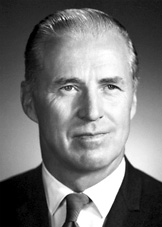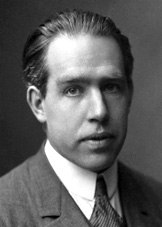Sunday, 13 Sep 2009
Norman Borlaug - The Father Of Green Revolution!!!
 Agricultural scientist Norman Borlaug, the father of the “green revolution” who won the Nobel Peace Prize for his role in combating world hunger and saving hundreds of millions of lives, died Saturday in Texas, a Texas A&M University spokeswoman said. He was 95.
Agricultural scientist Norman Borlaug, the father of the “green revolution” who won the Nobel Peace Prize for his role in combating world hunger and saving hundreds of millions of lives, died Saturday in Texas, a Texas A&M University spokeswoman said. He was 95.
The Nobel committee honored Borlaug in 1970 for his contributions to high-yield crop varieties and bringing other agricultural innovations to the developing world. Many experts credit the green revolution with averting global famine during the second half of the 20th century and saving perhaps 1 billion lives.
Thanks to the green revolution, world food production more than doubled between 1960 and 1990. In Pakistan and India, two of the nations that benefited most from the new crop varieties, grain yields more than quadrupled over the period.
Date: 13 Sep 2009 , Author: / Category: Legends, Science Legends / Views: 12687/Rating:4.1
Friday, 13 Mar 2009
Prince Louis-Victor de Broglie-- It is a matter of Waves!!!
When waves have a nature of particles(photon) whey not matter have property of waves ??? This paved way for a new dimension of Physics ![]()
Date: 13 Mar 2009 , Author: / Category: Science Legends / Views: 5408/Rating:5
ALBERT EINSTEIN - Man Of The millenium!!!
 If Issac Newton Influenced the physics in its formative stage, it is Einstein who has influenced in its youth stage and he is the one Who has a given an unprecepent dimension to the Study of physics.
If Issac Newton Influenced the physics in its formative stage, it is Einstein who has influenced in its youth stage and he is the one Who has a given an unprecepent dimension to the Study of physics.
Date: 13 Mar 2009 , Author: / Category: Science Legends / Views: 5321/Rating:3.5
Wednesday, 11 Mar 2009
Max Planck - The Photon Of Physics
Date: 11 Mar 2009 , Author: / Category: Science Legends / Views: 4753/Rating:NAN
Saturday, 24 Jan 2009
Niels Bohr

|
Bohr can be described as one of the most influential physicists of the 20th century...
|
Date: 24 Jan 2009 , Author: / Category: Science Legends / Views: 4268/Rating:NAN / Comments:
Thomas Alva Edison
Thomas Alva Edison patented 1,093 inventions in his life time, earning him the nickname "The Wizard of Menlo Park" . This shows ...
Date: 24 Jan 2009 , Author: / Category: Science Legends / Views: 4419/Rating:1 / Comments:
Friday, 23 Jan 2009
Aristotle
 Aristotle (384 BC 322 BC) was a Greek philosopher. He was a student of Plato and teacher of Alexander the Great. He wrote on many subjects like physics, metaphysics, poetry, theater, music, logic, rhetoric, politics, government, ethics, biology and zoology.The trio of Socrates, Plato and Aristotle formed the basic foundation of Western Philosophy.Plato's and Aristotle's writings form the core of Ancient sciences.
Aristotle (384 BC 322 BC) was a Greek philosopher. He was a student of Plato and teacher of Alexander the Great. He wrote on many subjects like physics, metaphysics, poetry, theater, music, logic, rhetoric, politics, government, ethics, biology and zoology.The trio of Socrates, Plato and Aristotle formed the basic foundation of Western Philosophy.Plato's and Aristotle's writings form the core of Ancient sciences.
The works of Aristotle that still exist today are in treatise form and were, for the most part, unpublished texts. These were probably lecture notes or texts used by his students, and were almost certainly revised repeatedly over the course of years. As a result, these works tend to be eclectic, dense and difficult to read.Among the most important of his works are Physics, Metaphysics, Nicomachean Ethics, Politics, De Anima (On the Soul) and Poetics. He is one of the very few figures in history who studied almost every subject possible at that time. In science, Aristotle studied anatomy, astronomy, embryology, geography, geology, meteorology, physics, and zoology.
His combined works practically comprise an encyclopedia of Greek knowledge.
Please click here to have a look at some of his classical works on MIT website.
His elegant treatises and dialogues were considered as 'River Of Gold' by Cicero.But only one-third of his works are available now.
Life Of Aristotle
Aristotle was born in 384 BCE. at Stagirus, a Greek colony and seaport on the coast of Thrace. His father Nichomachus was court physician to King Amyntas of Macedonia, and from this began Aristotle's long association with the Macedonian Court, which considerably influenced his life. While he was still a boy his father died. At age 17 his guardian, Proxenus, sent him to Athens, the intellectual center of the world, to complete his education. He joined the Academy and studied under Plato, attending his lectures for a period of twenty years. In the later years of his association with Plato and the Academy he began to lecture on his own account, especially on the subject of rhetoric. At the death of Plato in 347, the pre-eminent ability of Aristotle would seem to have designated him to succeed to the leadership of the Academy. But his divergence from Plato's teaching was too great to make this possible, and Plato's nephew Speusippus was chosen instead. At the invitation of his friend Hermeas, ruler of Atarneus and Assos in Mysia, Aristotle left for his court. He stayed there three years and, while there, married Pythias, the niece of the King. In later life he was married a second time to a woman named Herpyllis, who bore him a son, Nichomachus. At the end of three years Hermeas was overtaken by the Persians, and Aristotle went to Mytilene. At the invitation of Philip of Macedonia he became the tutor of his 13 year old son Alexander (later world conqueror); he did this for the next five years. Both Philip and Alexander appear to have paid Aristotle high honor, and there were stories that Aristotle was supplied by the Macedonian court, not only with funds for teaching, but also with thousands of slaves to collect specimens for his studies in natural science. These stories are probably false and certainly exaggerated.
Upon the death of Philip, Alexander succeeded to the kingship and prepared for his subsequent conquests. Aristotle's work being finished, he returned to Athens, which he had not visited since the death of Plato. He found the Platonic school flourishing under Xenocrates, and Platonism the dominant philosophy of Athens. He thus set up his own school at a place called the Lyceum. When teaching at the Lyceum, Aristotle had a habit of walking about as he discoursed. It was in connection with this that his followers became known in later years as the peripatetics, meaning "to walk about." For the next thirteen years he devoted his energies to his teaching and composing his philosophical treatises. He is said to have given two kinds of lectures: the more detailed discussions in the morning for an inner circle of advanced students, and the popular discourses in the evening for the general body of lovers of knowledge. At the sudden death of Alexander in 323 BCE., the pro-Macedonian government in Athens was overthrown, and a general reaction occurred against anything Macedonian. A charge of impiety was trumped up against him. To escape prosecution he fled to Chalcis in Euboea so that (Aristotle says) "The Athenians might not have another opportunity of sinning against philosophy as they had already done in the person of Socrates." In the first year of his residence at Chalcis he complained of a stomach illness and died in 322 BCE.
The works of Aristotle can be categorised in to three headings.
- Dialogues and other works of a popular character
- Collections of facts and material from scientific treatment
- systematic works
The only important work that is left behind is the On the Polity of the Athenians.
Aristotle Physics
Aristotle sees the universe as a scale lying between the two extremes: form without matter is on one end, and matter without form is on the other end. The passage of matter into form must be shown in its various stages in the world of nature. To do this is the object of Aristotle's physics, or philosophy of nature. It is important to keep in mind that the passage from form to matter within nature is a movement towards ends or purposes. Everything in nature has its end and function, and nothing is without its purpose. Everywhere we find evidences of design and rational plan. No doctrine of physics can ignore the fundamental notions of motion, space, and time. Motion is the passage of matter into form, and it is of four kinds: (1) motion which affects the substance of a thing, particularly its beginning and its ending; (2) motion which brings about changes in quality; (3) motion which brings about changes in quantity, by increasing it and decreasing it; and (4) motion which brings about locomotion, or change of place. Of these the last is the most fundamental and important.
Aristotle rejects the definition of space as the void. Empty space is an impossibility. Hence, too, he disagrees with the view of Plato and the Pythagoreans that the elements are composed of geometrical figures. Space is defined as the limit of the surrounding body towards what is surrounded. Time is defined as the measure of motion in regard to what is earlier and later. it thus depends for its existence upon motion. If there where no change in the universe, there would be no time. Since it is the measuring or counting of motion, it also depends for its existence on a counting mind. If there were no mind to count, there could be no time. As to the infinite divisibility of space and time, and the paradoxes proposed by Zeno, Aristotle argues that space and time are potentially divisible ad infinitum, but are not actually so divided.
After these preliminaries, Aristotle passes to the main subject of physics, the scale of being. The first thing to notice about this scale is that it is a scale of values. What is higher on the scale of being is of more worth, because the principle of form is more advanced in it. Species on this scale are eternally fixed in their place, and cannot evolve over time. The higher items on the scale are also more organized. Further, the lower items are inorganic and the higher are organic. The principle which gives internal organization to the higher or organic items on the scale of being is life, or what he calls the soul of the organism. Even the human soul is nothing but the organization of the body. Plants are the lowest forms of life on the scale, and their souls contain a nutritive element by which it preserves itself. Animals are above plants on the scale, and their souls contain an appetitive feature which allows them to have sensations, desires, and thus gives them the ability to move. The scale of being proceeds from animals to humans. The human soul shares the nutritive element with plants, and the appetitive element with animals, but also has a rational element which is distinctively our own. The details of the appetitive and rational aspects of the soul are described in the following two sections.
Date: 23 Jan 2009 , Author: / Category: Science Legends / Views: 3923/Rating:5
